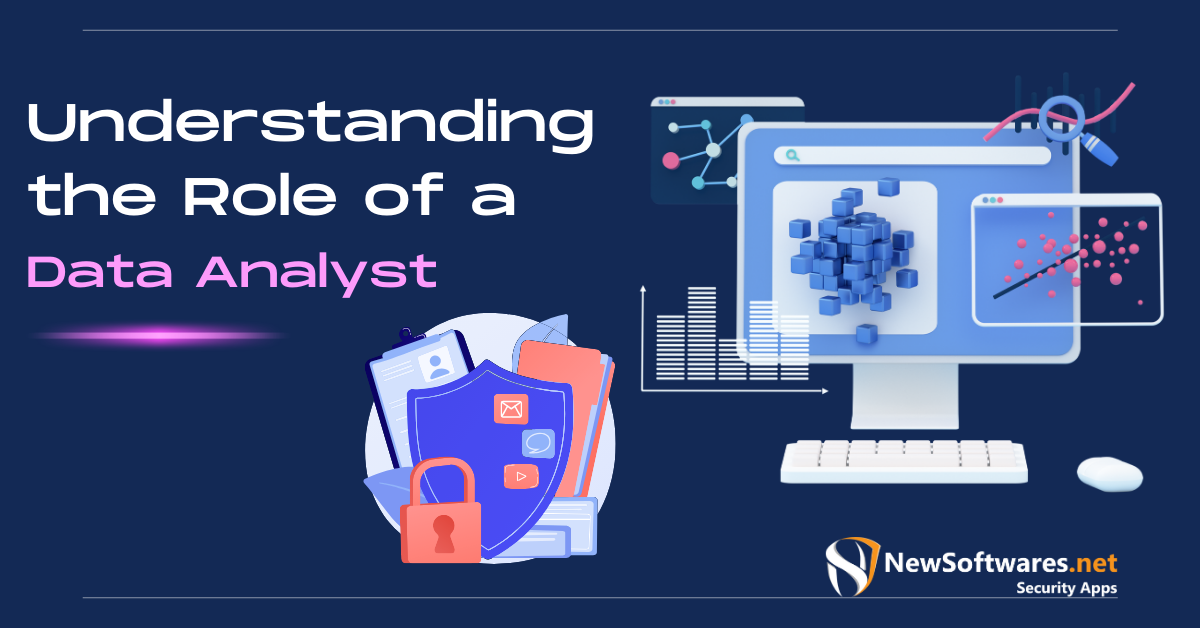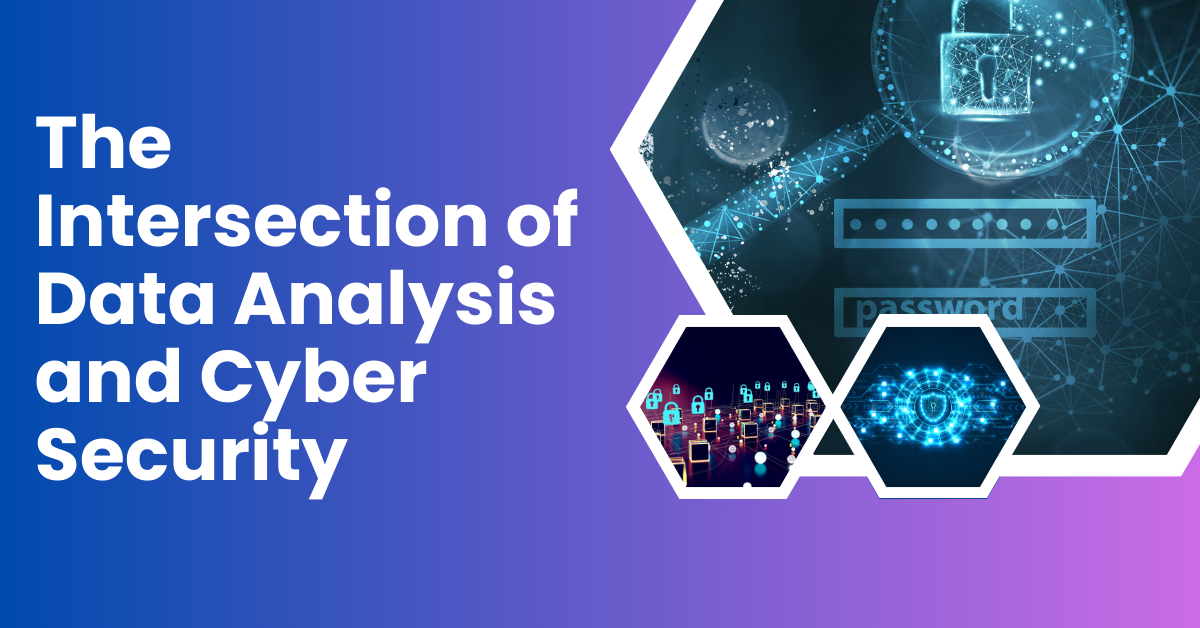While cybersecurity is not the primary focus for data analysts, understanding basic cybersecurity principles can be beneficial for them to ensure data protection.
Data analysis has become a crucial aspect of modern business operations. With the ever-increasing volume of data generated, organizations employ skilled data analysts to make sense of this information and derive actionable insights. However, when it comes to cyber security, many might wonder if data analysts play a role in safeguarding sensitive information and protecting against online threats. We will discover the connection between data analysis and cyber security and understand how these two disciplines go hand in hand.
Understanding the Role of a Data Analyst

Before delving into the relationship between data analysis and cyber security, it is essential to comprehend the responsibilities of a data analyst. A data analyst is an individual who collects, organizes, and interprets large datasets to identify trends, patterns, and correlations. They are vital in helping administrations make knowledgeable decisions and improve their overall performance.
Data analysts are like detectives in the world of data. They are skilled at investigating vast amounts of information, searching for hidden insights that can unlock the potential of businesses. By analyzing data, they can uncover valuable information that may have gone unnoticed.
One of the key responsibilities of a data analyst is collecting and cleaning data to ensure its accuracy and reliability. This process involves gathering data from various sources, such as databases, spreadsheets, and online platforms. Data analysts meticulously examine the data, removing any inconsistencies or errors that could skew the analysis.
Once the data is cleaned, data analysts perform statistical analysis to extract meaningful insights. They use statistical techniques to identify patterns, correlations, and trends within the data. This analysis helps organizations understand customer behavior, market trends, and other important factors that can drive business decisions.
Creating visualizations and reports is another crucial aspect of a data analyst’s role. They transform complex data into easy-to-understand visual representations, such as charts, graphs, and dashboards. These visualizations enable stakeholders to grasp the insights quickly and make knowledgeable decisions based on the data.
Data analysts also collaborate with cross-functional teams to identify business opportunities. By working closely with departments like marketing, finance, and operations, they comprehensively understand the organization’s goals and challenges. This collaboration allows data analysts to provide valuable insights and recommendations that can drive strategic initiatives and improve overall performance.
Skills Required for Data Analysis
Professionals need to possess a diverse skill set to excel in data analysis. Some important skills include:
- Strong analytical and problem-solving abilities: Data analysts must have an intense eye for detail and the ability to think critically. They should be able to break down complex problems into manageable components and develop effective solutions.
- Skill in programming languages such as Python or R: Data analysts often use programming languages to manipulate and analyze data. Proficiency in languages like Python or R allows them to automate tasks, perform complex calculations, and develop data models.
- Knowledge of statistical concepts and data visualization techniques: A solid understanding of statistical concepts is essential for data analysts to interpret data accurately. They should also be familiar with various data visualization techniques to communicate their findings to stakeholders effectively.
- Excellent statement and presentation skills: Data analysts must convey complex information clearly and concisely. They should be able to communicate their findings to both technical and non-technical audiences, making the data accessible and actionable.
Data analysts play a crucial role in helping administrations make data-driven decisions. Their skills and expertise in collecting, analyzing, and interpreting data provide valuable insights that can drive business growth and success.
The Intersection of Data Analysis and Cyber Security

Data analysis and cyber security are not mutually exclusive fields. Data analysts play a significant role in ensuring data integrity, confidentiality, and availability in cyber security.
Importance of Cyber Security in Data Analysis
With the rise in cyber-attacks and data openings, organizations are becoming increasingly aware of the importance of cyber security. Data analysts are crucial in this aspect as they help identify potential vulnerabilities in systems and networks. By analyzing patterns and trends in data, they can spot any unusual or malicious activities and prevent security incidents.
For example, imagine a large financial institution that collects and stores vast amounts of sensitive customer information. Data analysts in this organization play a vital role in ensuring that this data is protected from cyber threats. They analyze various data sources, such as server logs, network traffic, and user behavior, to detect anomalies that could indicate a potential breach. By leveraging their analytical skills, they can identify patterns of suspicious behavior and take proactive measures to mitigate the risk.
Furthermore, data analysts collaborate closely with cybersecurity professionals to develop robust security measures. By understanding the intricacies of data analysis, they can assist in designing and applying effective security controls. They contribute to developing models that predict and prevent future security breaches, leveraging historical data to identify potential vulnerabilities and recommend appropriate countermeasures.
How Data Analysis Contributes to Cyber Security
Data analysts contribute to cyber security efforts in multiple ways:
- Identifying patterns of suspicious behavior that may indicate a cyber attack.
- Developing models to predict and prevent future security breaches.
- Analyzing log files and network traffic to detect unauthorized access.
- Assessing the effectiveness of security controls through data-driven evaluations.
Let’s delve deeper into each of these contributions:
Firstly, data analysts excel at identifying patterns and trends in large datasets. They can apply this skill to cyber security by analyzing various data sources, such as system logs, user activity logs, and network traffic. By scrutinizing these data sets, they can detect patterns of doubtful behavior that may indicate a cyber attack. For example, they might notice a sudden surge in failed login attempts from a specific IP address, suggesting a potential brute-force attack. By promptly identifying such patterns, data analysts can alert the appropriate security teams and take immediate action to prevent a breach.
Secondly, data analysts are crucial in developing models that predict and prevent future security breaches. They can identify common attack vectors by analyzing historical data on previous cyber attacks and develop predictive models to anticipate and mitigate similar threats. These models can help organizations proactively strengthen their security posture by implementing preventive measures and fortifying vulnerable areas.
Thirdly, data analysts are adept at analyzing log files and network traffic. By examining these data sources, they can identify unauthorized access attempts and potential security breaches. For instance, they might notice unusual network traffic patterns or unauthorized access attempts to critical systems. Through their analysis, they can promptly detect and respond to such incidents, minimizing the impact and preventing further compromise.
Lastly, data-driven evaluations are essential for assessing the effectiveness of security controls. Data analysts can leverage their analytical skills to evaluate the performance of security measures and identify any gaps or weaknesses. By analyzing relevant data, such as incident response times, system uptime, and user compliance with security policies, they can provide valuable insights to improve the overall security posture of an organization.
In conclusion, the intersection of data analysis and cyber security is vital in today’s digital landscape. Data analysts contribute significantly to ensuring data integrity, confidentiality, and availability by identifying vulnerabilities, developing predictive models, analyzing log files and network traffic, and evaluating the effectiveness of security controls. Their expertise and analytical prowess are crucial in safeguarding organizations against cyber threats and mitigating the risks associated with data breaches.
Training and Education for Data Analysts
To pursue a career in data analysis, individuals must acquire the necessary training and education. This field requires a strong foundation in various technical skills and knowledge areas.
Essential Courses for Aspiring Data Analysts
Aspiring data analysts should consider taking courses in statistical analysis and probability theory. These courses provide the fundamental concepts and techniques to analyze data and make informed decisions. Understanding statistical concepts such as hypothesis testing, regression analysis, and probability distributions is crucial for data analysts to draw meaningful insights from data.
In addition to statistical analysis, database management and SQL programming courses are essential for data analysts. Databases are the backbone of data storage and retrieval, and SQL (Structured Query Language) is the standard programming language used to interact with databases. Learning how to efficiently query databases, manipulate data, and perform data transformations using SQL is a fundamental skill for data analysts.
Data visualization and reporting techniques are also important courses for aspiring data analysts. Connecting findings and insights through visual representations effectively is crucial in conveying complex information to stakeholders. Courses in data visualization teach students how to create compelling visualizations using tools like Tableau, Power BI, or Python libraries like Matplotlib and Seaborn.
Lastly, machine learning and predictive modeling courses are highly recommended for aspiring data analysts. Machine learning algorithms enable data analysts to figure out models that can make predictions or classify data based on patterns and relationships. Understanding the principles behind popular machine learning algorithms and applying them to real-world problems is a valuable skill for data analysts.
Cyber Security Knowledge for Data Analysts

While not all data analysts may specialize in cyber security, a basic understanding of it can be beneficial. Courses related to cyber security can help data analysts understand common cyber threats and attack vectors. They learn about encryption techniques and data protection methods to ensure the security and honesty of sensitive data.
Data analysts with cyber security knowledge can also develop skills to detect and respond to security incidents. Understanding how to identify signs of a potential breach and having the ability to take appropriate actions to mitigate risks is crucial in today’s data-driven world.
Moreover, data analysts must stay updated on emerging cyber security trends and best practices. Cyber security is continually evolving, with new threats and vulnerabilities emerging regularly. Data analysts can proactively implement security measures and protect valuable data assets by staying informed.
In conclusion, acquiring the necessary training and education is vital for aspiring data analysts. Courses in statistical analysis, database management, data visualization, and machine learning provide a strong foundation in technical skills. Additionally, a basic understanding of cyber security can enhance a data analyst’s capabilities and protect sensitive data.
The Future of Data Analysis and Cyber Security
Data analysis and cyber security are rapidly evolving fields, driven by technological advancements and emerging trends.
Emerging Trends in Data Analysis and Cyber Security
Some of the emerging trends in these fields include:
- The growing usage of artificial intelligence and machine learning in data analysis.
- The integration of big data analytics and threat intelligence in cyber security.
- The focus is on privacy and data protection rules, such as the General Data Protection Regulation (GDPR).
The Impact of Technological Advancements on Data Analysis and Cyber Security
Technological advancements, such as the Internet of Things (IoT) and cloud computing, are reshaping the landscape of data analysis and cyber security. Data analysts and cyber security professionals will face new challenges and opportunities as more devices and systems become interconnected.
Key Takeaways
- Data analysts primarily focus on interpreting and analyzing data.
- Basic cybersecurity knowledge can help analysts protect sensitive data.
- Some organizations may require data analysts to undergo cybersecurity training.
- Data analysts often collaborate with IT and cybersecurity teams.
- Cybersecurity and data analytics are distinct fields but can overlap in some areas.
FAQs
Q: Is cybersecurity a primary responsibility for data analysts?
A: No, data analysts mainly focus on interpreting and analyzing data. However, understanding cybersecurity can be beneficial.
Q: Why would a data analyst need to understand cybersecurity?
A: A basic understanding can help protect the sensitive data they work with from potential threats.
Q: Do data analysts collaborate with cybersecurity professionals?
A: Data analysts often work closely with IT and cybersecurity teams, especially when handling sensitive data.
Q: Can a data analyst transition to a cybersecurity role?
A: While they are distinct fields, with the right training and skills, a data analyst could transition into a cybersecurity role.
Q: Is there any overlap between data analytics and cybersecurity?
A: Both fields deal with data, and ensuring its security and integrity can sometimes overlap in responsibilities.
Conclusion
In conclusion, data analysts do play a role in cyber security. Their expertise in analyzing large datasets and identifying patterns helps organizations detect and prevent potential security breaches. As data analysis and cyber security continue to evolve, professionals in these domains must stay current with the latest trends and technologies to effectively safeguard sensitive information in the digital age.
